For most working Ugandans, the dream of owning a decent home remains just that—a dream. With soaring construction costs, high interest rates, and a complex mortgage application process, many lower-middle-class earners find themselves locked out of the property ladder. Despite over 60% of Uganda’s urban population residing in informal settlements, the journey to homeownership is often too steep a climb.
Now, Stanbic Bank Uganda, the country’s largest commercial lender, is working to dismantle these barriers.
In a bold move that aligns with its ambition to become Uganda’s number one private bank by 2028, Stanbic has launched a pre-approved mortgage solution that gives existing clients access to up to UGX 500 million, without the hurdles of the traditional loan application process.
“Homeownership should not be a privilege for a few—it should be an achievable milestone for every Ugandan who works hard and earns a stable income,” said Damalie Kairumba, Head of Mortgage Finance at Stanbic.
The innovation leverages customer banking history, income patterns, and KYC data to automate prequalification, cutting paperwork and delays. Qualified clients can buy land, acquire completed homes, build from scratch, refinance or consolidate debt, or secure land titles for kibanja plots.
With rates as low as 16.5% (UGX) and 9% (USD), and loan limits of UGX 3.7 billion (USD 1 million) repayable over 25 years, Stanbic is offering one of Uganda’s most flexible home loan products yet.
Partnered Approach: The Developers on Board
To streamline the path to homeownership, Stanbic Bank Uganda has partnered with select real estate developers whose projects are intended to be readily accessible to pre-approved mortgage clients. Among the first named partners in this initiative are Universal Multipurpose Enterprises Ltd and Pearl Marina Estates Ltd.
These developers are working closely with the bank to simplify the home-buying journey—from property selection and valuation to financing and handover.
“We’ve worked with Stanbic to streamline the entire experience—from property identification to financing. This is how we make dreams come true,” said Muffaddal Yeolawala, Director at Universal Multipurpose Enterprises Ltd.
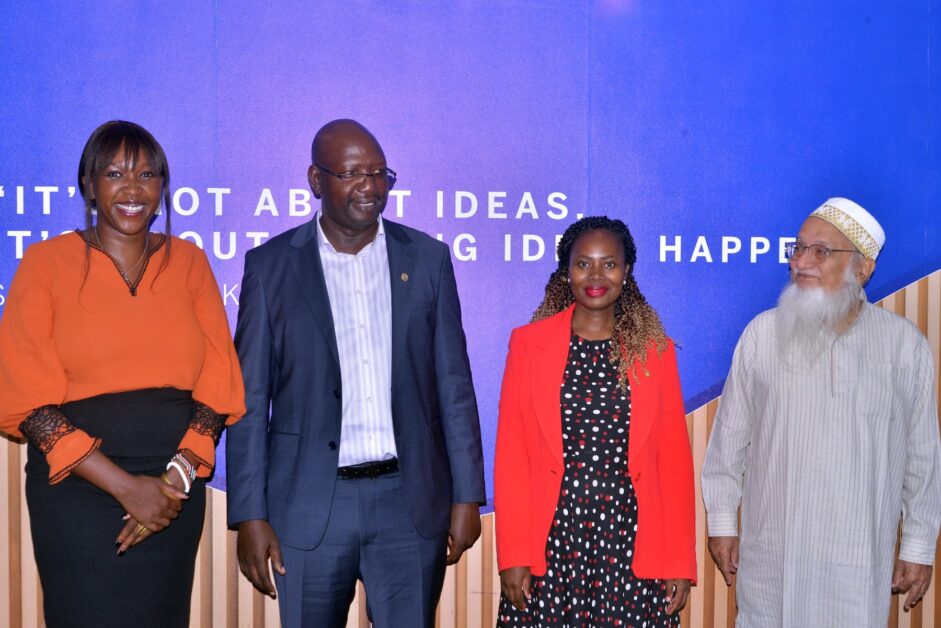
Sylvia Alal, Sales and Marketing Manager at Pearl Marina Estates Ltd, echoed this optimism: “This level of financial innovation is exactly what Uganda’s housing sector has needed. It means our buyers are now more confident, more empowered, and more ready to invest in long-term homes.”
While the broader partner network may grow over time, these early collaborations set the tone for a model that aims to reduce friction and increase transparency in Uganda’s real estate financing ecosystem. However, the quality and compliance records of developer partners—particularly in light of recent IGG investigations—will remain under close scrutiny as the rollout continues.
IGG Flags Universal Projects: A Trail of Structural, Safety, and Ethical Failures
The Inspectorate of Government’s official report dated 22nd August 2024, following months of inspection into condominium housing developments across Kampala, identified Universal Multipurpose Enterprises Ltd (commonly known as Universal Properties) as a repeat offender in delivering substandard, unsafe, and unethical housing units.
Three of the company’s projects—Swan Residences, Leo Zodiac, and Sunrise Apartments—were explicitly cited for extensive structural defects, lack of occupancy permits, and serious health and safety violations.
At Swan Residences, located along the Kireka–Namugongo Road, the Inspectorate of Government (IGG) uncovered a series of deeply troubling issues that raise serious concerns about structural integrity, regulatory compliance, and value for money.
Despite homeowners moving into the premises as early as 2022, the development had not received occupancy permits. Many buyers took possession of apartments that were still incomplete, forcing them to personally fund interior finishes and basic fittings that should have been delivered by the developer. Perhaps most alarming, the IGG report noted that cracks had developed in the columns supporting a structure built directly above one of the swimming pools, posing a clear risk to the safety of residents and the building’s stability.
Additional safety and functionality concerns were widespread. The buildings had no designated fire escape, and the plumbing system was riddled with leakages. Water pressure was so poor that residents on the upper floors had to purchase and install their own booster pumps to access basic water flow.
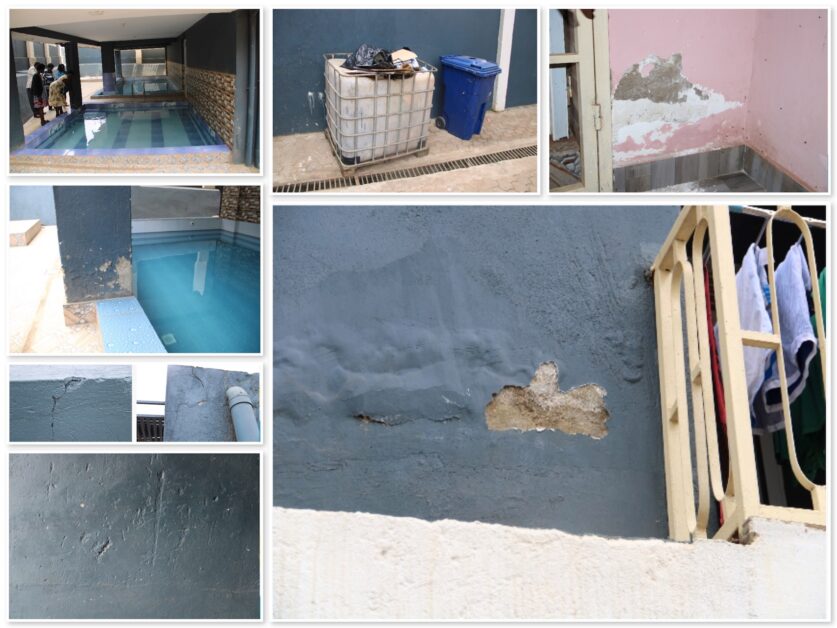
Facilities that were marketed as part of the residential offering also fell short of expectations. The gym was non-functional, with broken equipment and no working lighting or washroom facilities. Despite the promise of inclusive features, residents reported being charged between UGX 10–12 million extra for store rooms that had been presented in the original marketing as part of the purchase package.
Even the handover process was mishandled. No formal transition took place, and the property is currently managed by Cornerstone Management, which has been criticized for inadequate waste management—including providing only a single small disposal bin for over 100 housing units. Additionally, septic tanks were installed within the parking lot, a design flaw that underscores broader infrastructural miscalculations in the development.
At Leo Zodiac Apartments in Najjeera, residents began occupying units between 2018 and 2019, only to discover a litany of serious structural and design defects that have since made the development a source of frustration and concern.
The Inspectorate of Government (IGG) found that the buildings exhibited cracks throughout—on the exterior walls, foundations, and even inside individual living rooms. In a particularly disturbing finding, sewage from the apartments was being discharged into a neighboring property, reflecting a failure in both plumbing design and environmental compliance.
The building’s flat roof design proved deeply problematic, leading to frequent water retention and leakages, especially during heavy rains. In one reported case, the ceiling of Apartment 19 was on the verge of collapsing due to persistent water damage. In addition, a storm blew off part of the rooftop iron sheets, exposing the structure to further deterioration.
Homeowners also raised concerns about the quality of fittings and finishes, many of which were substandard and had to be replaced at their own expense shortly after moving in. The compound itself is prone to flooding, and no stormwater drainage system was incorporated into the original design—forcing residents to wade through stagnant water to access their homes during the rainy season.
In a desperate attempt to address the roofing issues, residents contracted an engineering firm in 2023 to carry out repairs. However, after assessing the site, the firm abandoned the project, stating that the roofing defects were too extensive and beyond superficial remediation.
Constructed around 2019, Sunrise Apartments, located in Naalya opposite Children’s Clinic, was similarly flagged by the Inspectorate of Government (IGG) for multiple critical deficiencies that severely compromise both safety and livability.
Despite marketing materials that showcased a fully serviced property with a swimming pool, no pool was ever installed, leaving residents feeling misled about the amenities they had paid for. More troubling, however, were the extensive structural issues identified throughout the development. The IGG inspection found deep cracks on both the exterior and interior walls, while facing bricks were falling off, and interior paint repeatedly peeled, even after several attempts at repainting—indicating persistent dampness and foundational problems.
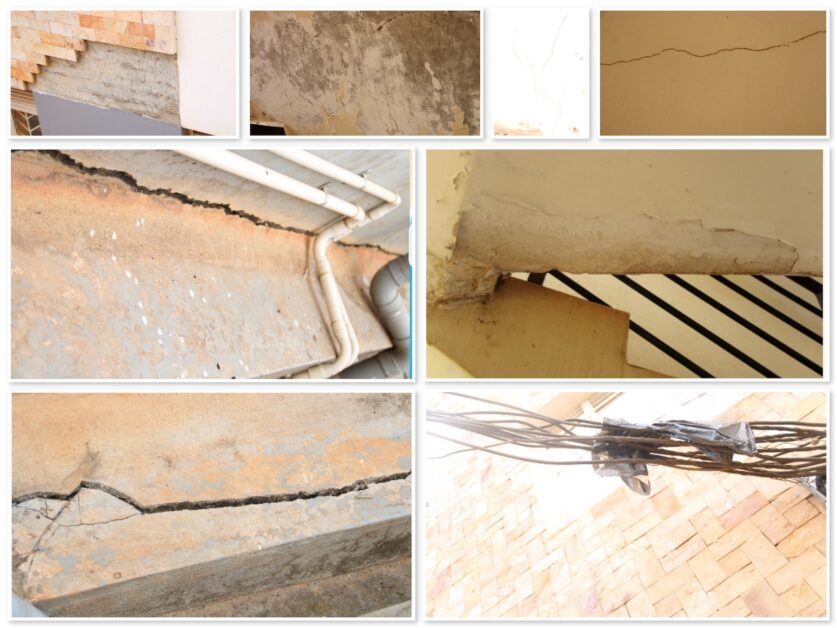
During storms, water seeps through the roof tiles and floods the staircases, making access not only inconvenient but dangerous. The building’s waste management system was grossly inadequate; the installed sock pit was too small to handle the volume of sewage from the two blocks housing 88 units. As a result, homeowners were forced to improvise their own makeshift reservoirs and drainage piping to avoid backups and overflow.
Additional safety hazards were documented, including exposed electrical wiring, which poses a serious fire risk, and cracked floor tiles, which present physical dangers to both children and the elderly.
These findings paint a damning picture of systemic failure by Universal Properties to deliver safe, compliant, and dignified housing—yet the firm remains listed as a partner in Stanbic Bank Uganda’s new mortgage solution.
Beyond Universal Multipurpose Enterprises Ltd, the IGG’s August 2024 investigation also highlighted serious concerns with several other real estate developers operating in Kampala and its outskirts.
Related

 3rd Generation Succession: Is Sagar Keshwala the Heir Apparent to the Multibillion-Dollar Keshwala Group?
3rd Generation Succession: Is Sagar Keshwala the Heir Apparent to the Multibillion-Dollar Keshwala Group?
Among them was Fakhruddin Properties Uganda, whose projects—Lotus Vicinia, Waves, and Hazel Apartments—were all found to have significant construction and design flaws. These included faulty electrical wiring, leaking roofs, poor drainage systems, water-damaged walls, and low-grade interior fittings. The IGG also noted that some of the buildings lacked proper accessibility features for persons with mobility challenges, raising questions about inclusivity and basic design compliance.
Comfort Homes Ltd was also cited for its Casa Marcella development in Naalya, where residents reported water leaking from electric sockets, clogged pipes, cracked walls, and a lack of ventilation—posing both safety and health risks.
These findings, much like those related to Universal, reflect a broader pattern of inadequate oversight and poor construction standards in Uganda’s fast-growing condominium market. They further underscore the need for stronger coordination between banks, regulators, and developers to ensure that financing is tied to quality, safety, and long-term value for homebuyers.
Given the scale of these problems, the Inspectorate of Government has warned that banks could be enabling consumer losses by partnering with such developers without sufficient due diligence.
As noted by IGG Beti Kamya during the August 2024 report launch:
“They use the banks to do their marketing… The bank lends the money for a property which is not even approved by local authorities… Then they give you a substandard, fake, even dangerous product.”
For Stanbic Bank clients, especially first-time homeowners, this raises legitimate concerns about whether preapproved mortgages might be funding unsafe housing—and whether institutional credibility is being traded for commercial volume.
According to Amos Ngwomoya, a Public Relations Officer at the IGG’s office, following the preliminiary damning report, a special investigative committee—comprising experts from the IGG’s office, the Ministry of Lands, Housing and Urban Development, and the National Building Review Board—has been auditing properties in high-density city suburbs, including Naalya, Najjeera, Kireka, and Kungu.
“The investigations are ongoing, and a comprehensive report is being compiled,” said Ngwomoya.
Once finalised, the report is expected to inform enforcement actions and potential penalties against the implicated companies.
A Pattern of Institutional Neglect?
The partnership between Stanbic Bank and Universal Multipurpose Enterprises Ltd is no isolated concern—it represents a broader pattern of institutional neglect where banks, regulators, and private developers appear to have failed Ugandan homebuyers, especially in the rapidly expanding condominium market.
As far back as October 2023, during a stakeholder forum convened by the Inspector General of Government (IGG), the National Building Review Board, and the Ministry of Lands, Housing and Urban Development, several high-level warnings were issued. The concern was clear: banks were enabling the sale and financing of structurally compromised developments, placing Ugandans at financial and physical risk.
“Poor so-called homebuyer starts paying back the mortgage with interest when the property is still on the ground. Then when they finish the property, it is so substandard,” said IGG Beti Kamya at the October meeting.
These warnings turned into hard evidence in August 2024, when the IGG published its findings from onsite inspections across multiple condominium sites in Kampala and Wakiso.
Stanbic Faces Credibility Test
The decision by Stanbic Bank Uganda to partner with Universal Multipurpose Enterprises Ltd—a developer flagged by the IGG for shoddy construction—has placed the bank at the center of a growing debate about the responsibilities of financial institutions in protecting consumers from substandard housing.
Critics argue that by associating with developers under investigation, the bank risks undermining public trust in its mortgage offering—especially when targeting first-time and lower-middle-income homebuyers who may lack the technical knowledge to identify structural risks.
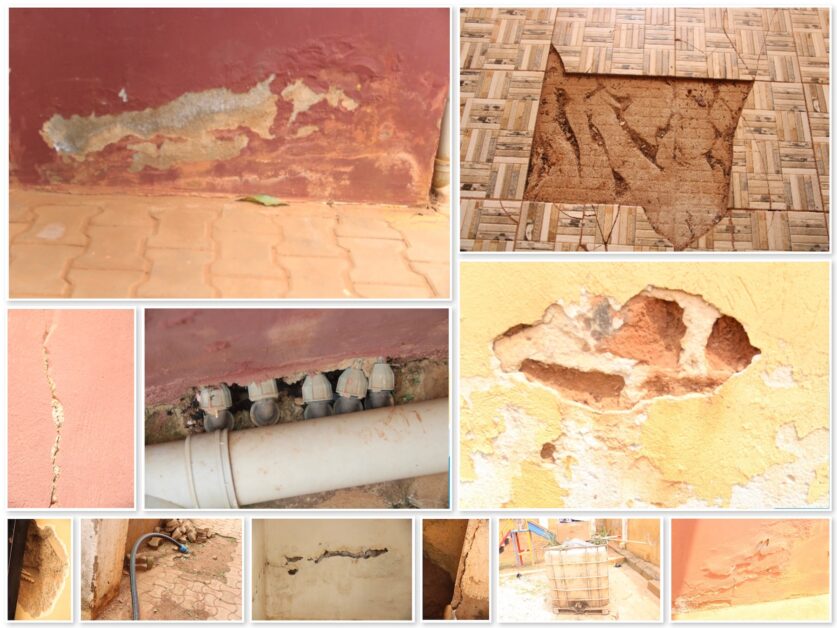
Yet, Stanbic Bank is standing by the integrity of its mortgage financing framework.
“At Stanbic Bank Uganda, the safety and financial well-being of our clients are of paramount importance,” said Kenneth Agutamba, the bank’s Head of Reputation and Communication.
“We understand that purchasing a home—particularly through a mortgage—is one of the most significant and long-term (five to 25 years) financial decisions a person can make. That is why our mortgage financing process is designed to protect both the client and the bank through rigorous due diligence and independent professional assessments.”
According to Agutamba, the bank does not—and cannot—finance substandard properties. Each mortgage application must be backed by a comprehensive valuation report conducted by a certified valuer from Stanbic’s approved register. These reports, he explained, go far beyond market pricing:
“They include a thorough physical inspection of the property, evaluate it under different sale conditions (including voluntary and forced sale scenarios), assess and in some cases, advise where technical structural integrity tests are required, and confirm legal ownership to ensure that the property is free from disputes or encumbrances,” he noted.
He added that if a report indicates that a property is below standard or presents any risk to the borrower or the bank, Stanbic will not proceed with the mortgage. In such cases, he believes it would also be “highly unlikely that an informed client would choose to move forward with the purchase.”
Agutamba further emphasised that the valuation process serves as a quality filter—not only to protect clients but to pressure developers into maintaining high construction and legal standards:
“The integrity of the valuation process acts as a quality filter that protects our clients, promotes industry standards, and ultimately contributes to a more robust and credible real estate sector,” he said.
“We remain committed to ensuring that all our financial products, including mortgage financing, empower Ugandans to make sound, secure, and future-focused investments.”
We further asked Agutamba if Stanbic had been party to financing some of the projects condemned in the IGG’s report, but he hadn’t responded to us by press time.
While the bank’s internal controls and vetting processes appear robust on paper, critics note that the existence of a certified valuation report does not always guarantee a defect-free property, especially in a market where occupancy permits are sometimes bypassed and completion certificates may not be fully enforced.
The question for many, then, is not whether Stanbic is doing something illegal—but whether its partnerships are aligned with the spirit of consumer protection, accountability, and the government’s own regulatory findings.
As more evidence from the IGG and National Building Review Board continues to emerge, Stanbic—and other banks—may find themselves under pressure to move beyond valuation reports and toward multi-agency vetting frameworks that flag repeat offenders before client funds are disbursed.
For now, the credibility test remains open—and its verdict will likely be delivered by the very customers Uganda’s largest bank is trying to empower.
Related Stories


UGANDA’S 100 OIL AND GAS LEADERS: Tony Otoa, Chief Corporate Affairs Officer, Uganda National Oil Company (UNOC)
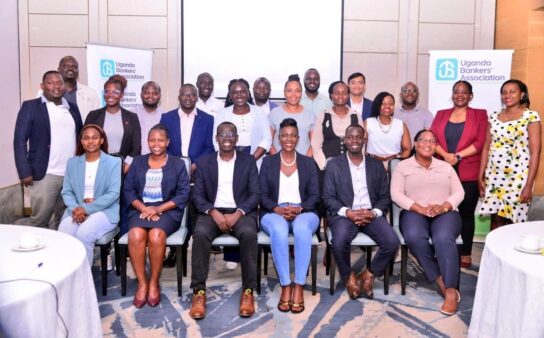

Executive Watch: Uganda Bankers Association elects Stanbic’s Cathy Adengo First Chairperson of Sustainability Committee


Stanbic Bank’s Agutamba named Chairman of UBA Peer Committee on Communication


Stanbic Bank Uganda at a Crossroads: Can Mumba Kalifungwa Reignite the Blue Spark of Yesteryears?
You May Also Like
3rd Generation Succession: Is Sagar Keshwala the Heir Apparent to the Multibillion-Dollar Keshwala Group?
MTN Uganda Taps Airtel Zambia’s Sylvia Elsheikh as New Chief Marketing Officer
UDB, Ministry of Finance to Meet Over Ndere’s UGX 10 Billion Loan
Digital Credit Doubles, But So Do Cyber Risks: Uganda’s Banking Paradox
Related posts
Meet the Author

Gillion is a multi-concept WordPress theme that lets you create blog, magazine, news, review websites. With clean and functional design and lots of useful features theme will deliver amazing user experience to your clients and readers.
Learn moreCategories
- Africa (12,123)
- Business (562)
- Design (3)
- East Africa (739)
- Guide (7)
- Interior (1)
- Life (1)
- Lifestyle (5)
- Motivation (4)
- People (3)
- Photography (2)
- Rest of Africa (731)
- Review (1)
- Science (72)
- Style (1)
- Travel (5)
- World (173)
Subscribe Now
* You will receive the latest news and updates on your favorite celebrities!



